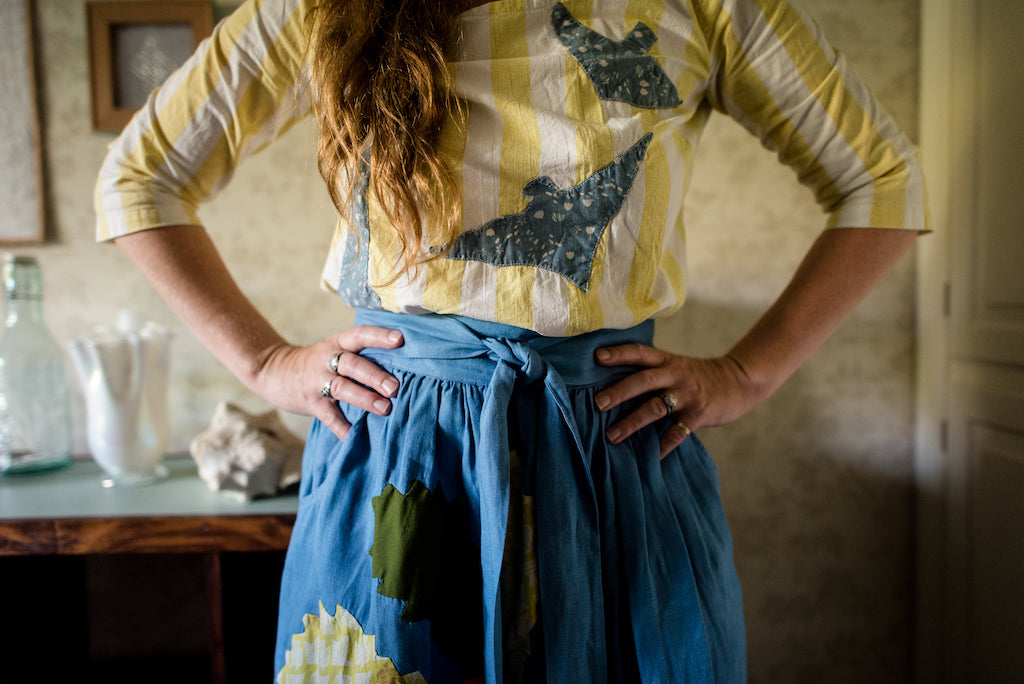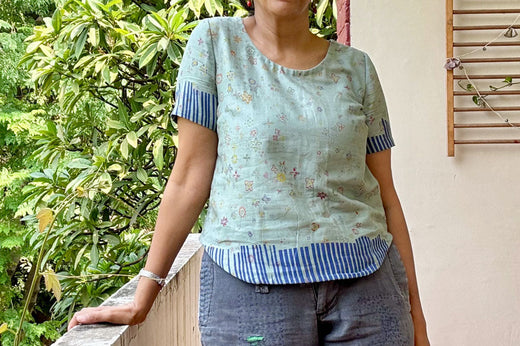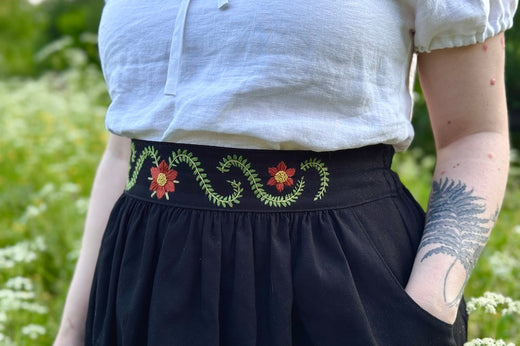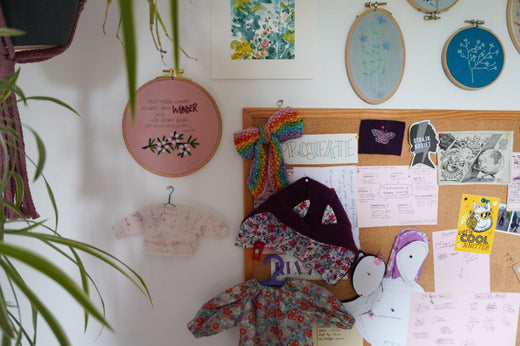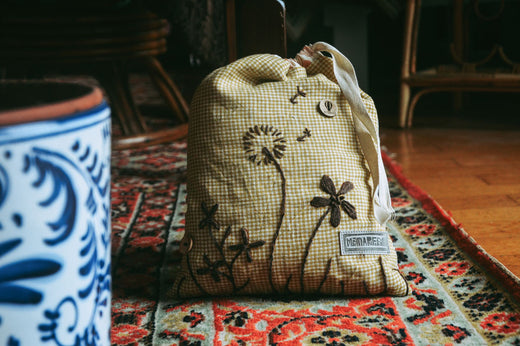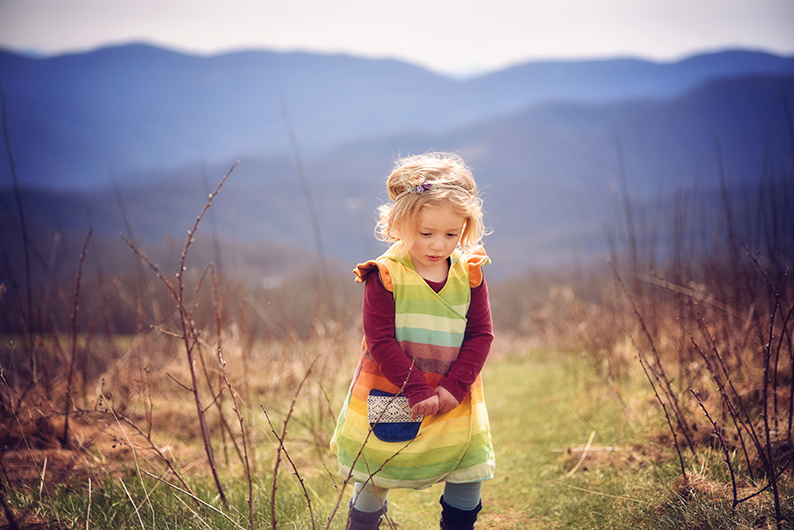Do you ever dream about sewing? Storyteller Sashanna Hart spotted an incredible quilt in a museum exhibit and the vibrant colours and unique princess feather design stayed with her.
She dreamed about replicating it, but first had come up with a pattern and learn how to do needle turn appliqué! Read on to learn more about how Sashanna took inspiration from a dream quilt, grew the skills necessary to replicate the technique, and transformed it into a stunning Meadow Skirt.

What do you think of when someone says the word, “Dream”?
Do you think of a place you have always wanted to visit, or an art form or craft that you would like to take up? Maybe your dreams include moving to an ideal spot, just so that you can be around the corner from your family. Perhaps it makes you think of books you have read, like Alice in Wonderland or any of The Chronicles of Narnia, in which children have adventures that take place in exactly that sliver of life between dreams and reality.
What do all of these things have in common? In all of them, including the novels I mentioned, dreaming is inextricably tied to what is currently unattainable. What is required for our dreams to become reality? While there are many possible answers to that question, my answer is growth.

In July, for my husband’s birthday, our family went to the nearby art museum, where there happened to be a quilt exhibit. It was my favorite of all the quilt exhibits I have ever seen. Most of the quilts were from the eighteenth and nineteenth centuries, and the handwork was exquisite. The quilts were frequently a combination of traditional patchwork piecing and needle turn appliqué.
Two quilts in particular stood out to me, primarily because of their bold use of solid colors, particularly a very bright orange. Quilter Elanor McCauley Atwater made these quilts between 1840 and 1860. One was a carpenter star quilt and the other was labeled as a princess feather, or wild cucumber block. They both felt incredibly modern while being consumate examples of the precise hand piecing and hand quilting that comes out of that period.
The princess feather quilt wholly consumed my imagination, particularly because of its uncommon appliqué pattern and bright orange background. Standing in front of the quilt I started dreaming of replicating the pattern myself. Never mind that I had never done any needle turn appliqué and that the entire quilt was hand quilted. I was going to make this happen!

As soon as we got home from the museum I went to my stash and pulled fabric for the project. I already knew that I had the right orange for the quilt. I purchased nine yards of pumpkin orange linen at the creative reuse store because it was discounted and it was very high quality. I had overdyed some of it for other projects and hadn’t thought I could possibly use it as it was because it was so bright. Suddenly I had the perfect use for it.
I found the last remnants of my treasured kona avocado fabric, some gifted Cotton and Steel Paper Birds, and a beautiful thrifted teal linen tablecloth, long stashed to make a summer skirt or dress. I had exactly the colors I needed, but I immediately realized I didn’t have enough of either the kona avocado or the Paper Birds. I started scouring the internet for places I could get the fabrics second hand. In the end I was given fabric of both colors from quilting friends, which makes the dream that much more special.

I started my artistic pursuits as a photographer. I have been taking photographs for 16 years now, and I landed on photography because it was “fast art.” I am an impatient person, so photography seemed exactly right. Since I started sewing during the pandemic, and especially since I became a Storyteller in 2023, I have been haltingly developing a true appreciation for slow art.
It doesn’t come naturally to me to be contemplative, but as I have matured in my sewing practice I have come to appreciate the growth that is possible when I do hard things. Needle turn appliqué is something I have generally admired but thought that, for me, it was impossible because it would take way too long. But that quilt changed things for me. I dreamed of making it, which meant I would have to grow into the capabilities to make it happen.
Quilts are a major investment of time, even when one isn’t attempting a new technique. As I thought about my dream I realized that I needed to practice the appliqué on something that was a bit more forgiving than a quilt block. I had long wanted a Meadow skirt in my wardrobe, and with starting a new teaching job in the fall which allows me to wear whatever bottoms I want with my uniform top, a skirt was definitely on my list of things to make. The teal linen had been intended for a such a garment forever, so it made sense to practice my block on the front of a Meadow skirt.

I started the project by drawing the block. After some research online I discovered that the style of Princess Feather block used by Mrs. Atwater was distinct from most of the blocks that fall under that name. There were no patterns available for what she had made, so I needed to make my own. Some freezer paper and several rulers were needed to get the center “flower” right. I then divided the block into eight sections, drew a feather, or leaf as I tend to think of them, traced it, and re-drew it in each of the other eight sections.

I then created templates from plastic so that I could trace the shapes multiple times without the template becoming distorted. For my quilt I needed 36 leaves in each of the two colors, and nine blue flower centers. I cut an additional four leaves of each color and an orange flower for the skirt, as I would be using the blue for the skirt itself. Tracing and cutting all those pieces was time consuming, but it ended up being a good thing to do in the evenings with my husband and son while we listened to lectures or our preferred podcast on the periodic table of the elements.

The Meadow skirt has a gorgeously gathered front and I knew I did not want to try to appliqué on something after it was gathered, so I cut out the whole skirt pattern and put all the pieces aside other than the front panel. I positioned the flower and leaves in such a way so that they would be close to the top and on the right side without accidentally getting any of the appliqué caught in the seam allowance. I used a washable glue stick to baste the pieces to the panel and then began the process of needle turn appliqué.

I tried doing it in my lap with no hoop, then I tried a hoop. I tried sitting and I tried standing at a tall table. I tried ladder stitch and whip stitch. I basically tried everything! I watched lots of videos and read lots of blog posts and in the end, the appliqué was finished. It took weeks. And while it was hard, I found myself loving it! I improved over the course of the piece and by the time I was done I had figured out the process that worked best for me. I had grown.

Once the appliqué was finished I dove into the process of constructing the Meadow skirt. That part of this project was delightfully simple! As with all Twig and Tale patterns I have had the honor of making, the instructions were clear and laid out in a logical fashion. I particularly enjoyed learning how to make a waistband with two, smaller, discrete pieces of elastic rather than one large one.

As soon as the skirt was completed I cut the first background block for my quilt. I used a slightly different technique when basting the pieces to the block using the knowledge I gained during my practice on the skirt. Given my lack of experience in appliqué while making the skirt I plan to always wash the skirt by hand and hang dry it. I may also need to use a little fray check in some of the interior points on the leaves to keep the lovely flower lasting a long time. The photos speak for themselves I think, but this garment is one I hope to wear for years! I am in love with it!

This is just the beginning of my dream, since I still have a lot of quilt blocks to make, but I feel completely at peace about that, which is a rare space for me. I know that the quilt will take a long time, especially since I plan to hand quilt it when I am done with the piecing, but it will grow, just like me, one leaf, one flower at a time. And while I wait I can rejoice in the one dream that I achieved this month – a gorgeous Meadow skirt.




See more of Sashanna's work here and here.
Read more articles from the Twig + Tale Storytellers here.
